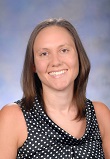About 70 University of Florida faculty, staff and students had the opportunity to hear about leading-edge cardio-oncology research and connect with researchers in a collegial environment during the inaugural UF Cardio-Oncology Symposium held at the Cancer Genetics Research Complex and virtually on March 1. The goal of the symposium, sponsored by the UF Health Cancer Center and the UF College of Pharmacy, was to foster a collaborative environment to spur new research projects and grant applications.

Three nationally known experts in cardio-oncology gave keynote talks on topics including artificial intelligence, racial disparities, and prostate cancer and cardiovascular disease. Four UF speakers from a range of disciplines — radiation oncology, nursing, applied physiology and kinesiology, and health outcomes and biomedical informatics — also gave presentations. The symposium included a poster session, Q&A period and opportunities for in-person attendees to network over breakfast and lunch.
Cardio-oncology is a multidisciplinary field that involves assessing the cardiotoxicity of cancer drugs and cancer treatment, as well as the direct effects of cancer on the heart, to improve the outcomes of patients with cancer. It includes basic science and clinical research on topics spanning genetic factors of cardiotoxicity to the role of exercise in preventing cardiac complications from chemotherapy.
“Our goal was to increase awareness of the field and bring people together across multiple colleges, from medicine to pharmacy to health and human performance to engineering,” said Katelyn Bruno, Ph.D., FHFSA, an assistant professor in the division of cardiovascular medicine in the UF department of medicine, who co-chaired the symposium. “We want to bridge that gap to develop new collaborations, feed ideas and get feedback. We also want to provide opportunities for trainees and grow the community at UF because it is an area that has broad interest.”
Yan Gong, Ph.D., an associate professor in the department of pharmacotherapy and translational research in the UF College of Pharmacy and the UF Center for Pharmacogenomics and Precision Medicine, co-chaired the symposium with Bruno, who joined the university in August. Soon after, the two formed a cardio-oncology interest group, which drew substantial interest.
Gong and Bruno are members of the Cancer Center’s Cancer Control & Population Sciences research program, co-led by Dejana Braithwaite, Ph.D., associate director for cancer population sciences at the Cancer Center and a professor of surgery and epidemiology in the UF College of Medicine and College of Public Health and Health Professions. Braithwaite suggested the two organize the symposium to attract broader interest and form a new Cardio-Oncology Working Group at the Cancer Cancer. The symposium served as a kickoff event for the working group, which aims to advance cardio-oncology through basic and translational research and foster early-career investigators.
One of the symposium’s keynote speakers, Sherry-Ann Brown, M.D., Ph.D., FACC, FAHA, an assistant professor of cardio-oncology at the Medical College of Wisconsin in Milwaukee, said the symposium provided a valuable opportunity to generate research connections at UF and beyond.
“Because cardio-oncology is inherently a combination of fields, it makes sense that you bring people together,” said Bruno, whose keynote focused on artificial intelligence and racial disparities in cardio-oncology. “I think it’s always wonderful to bridge people across silos because that’s when great synergy can happen. It’s exciting to be here. I love that it’s an inaugural symposium; being part of that is fun.”
In the future, Bruno and Gong hope to expand the symposium to include participants from institutions across Florida and beyond.
Michael Fradley, M.D., medical director at the Thalheimer Center for Cardio-Oncology and associate professor of clinical medicine at the Perelman School of Medicine at the University of Pennsylvania, delivered the symposium’s first keynote, which provided an overview of cardio-oncology. Avirup Guha, M.D., M.P.H., director of cardio-oncology at the Medical College of Georgia at Augusta University, delivered the other keynote, titled “Prostate Cancer and Cardiovascular Disease: Racial Disparities and Role of Chronic Toxic Stress/Allostatic Load.”
















UF speakers

Walter O’Dell, Ph.D.
Research Associate Professor, Department of Radiation Oncology
“Measuring Early Changes in Heart Function in Breast Cancer Patients”

Lakeshia Cousin, Ph.D., APRN, AGPCNP-BC
Assistant Professor, Department of Family, Community and Health Systems Science
“Cardio-Oncology Disparities: Interplay of Psychosocial Stress, Inflammation, and Cardiometabolic Health among Black Breast Cancer Survivors”

Ashley Smuder, Ph.D.
Assistant Professor, Department of Applied Physiology & Kinesiology
“Doxorubicin-Related Effects on Cardiorespiratory Function and Body Composition”

Shuang Yang
Ph.D. Student (Health Outcomes and Medical Informatics)
“Rate of Adverse Cardiovascular Events in Breast Cancer Patients Receiving Chemotherapy and Targeted Therapy”

